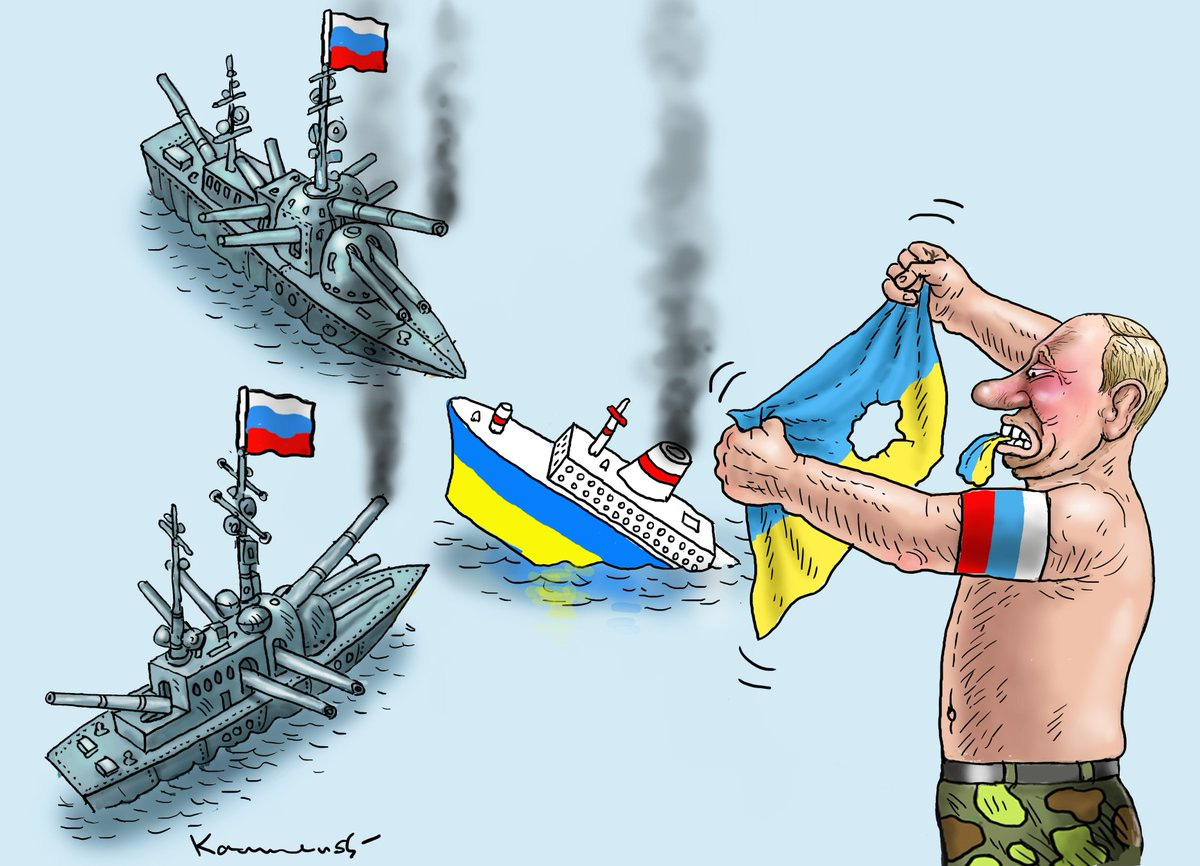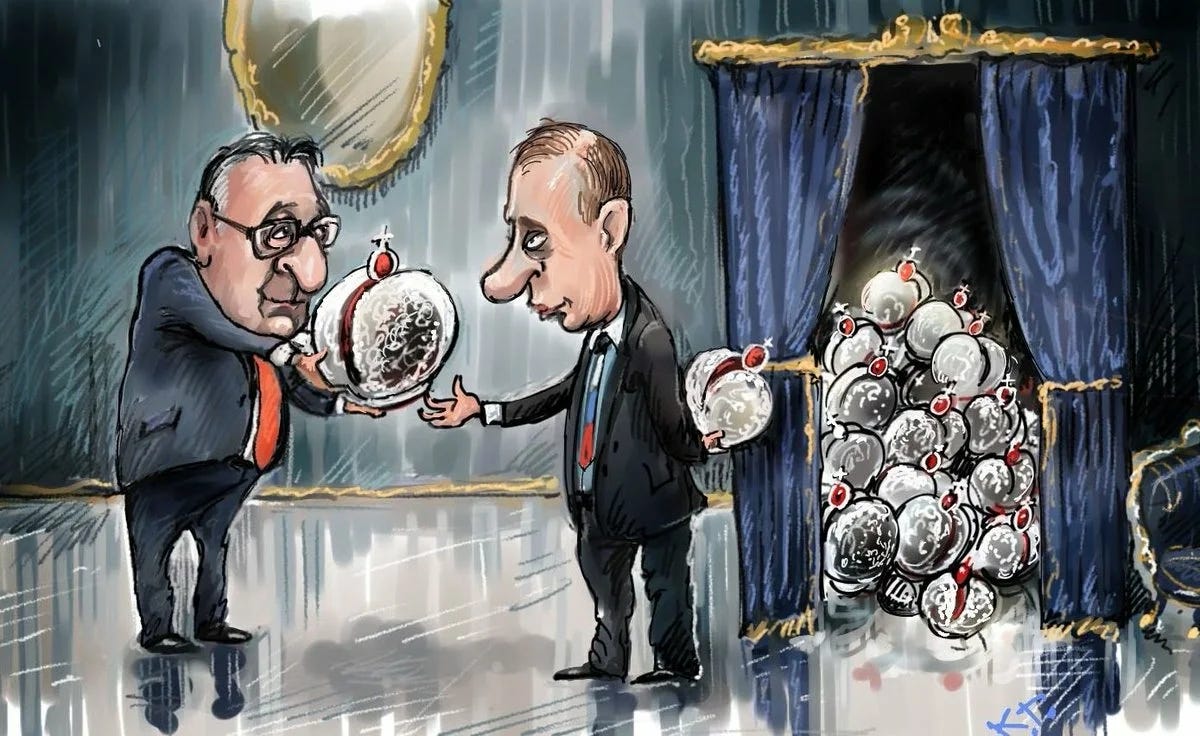April 28, 2022
The creeping annexation
Goodbye, assets?
Signs of contraction
Drink less juice
Surrender (crypto)currency!
Need to know less
Problems with road construction
Planes, but not enough passengers?
Is there import substitution?
The creeping annexation
Although the Kremlin does not acknowledge any plans for annexation or long-term occupation of Ukrainian territory outside the Luhansk and Donetsk regions, the process gradually is gaining momentum.
The Russian military has taken control of nearly all of Kherson Oblast. In recent days, there has been much talk of an upcoming “independence referendum,” like those held in the summer of 2014 that resulted in the proclamation of the LNR and DNR. Russian television and radio broadcasts have been launched in the area, and a civil-military administration of the region has been established. So far, no announcement has been made about the date of the referendum. Still, the deputy head of the administration, Kirill Stremousov, has already announced that as of May 1, the Russian ruble will become the official means of payment in the region, on par with the Ukrainian hryvnia. In four months, the hryvnia will no longer be in circulation.
Russian Deputy Prime Minister Marat Khusnullin implicitly confirmed that Russia had begun to view the Kherson region as permanently (if not forever) under its control. Russia’s main prize during the war was access to the North Crimean Canal (which carried water from the Dnieper River to the peninsula). The Russian government intends, as early as May, to begin financing the costs associated with its restoration and operation.
...a year ago, there was an acute water problem in the Crimea. We drew up a program for its reliable supply and implemented it in a year... As to the future… additional sources will be needed. Here, of course, the Crimean Canal will be useful to us... Now the Crimean Canal is undergoing an active survey. As a result, we’ll see what financing volume will be needed for it. But we have this money in the budget because it was planned for water supply. Shortly we will already understand the volume of costs; in May, we will approve the schedule of works on the canal.
Goodbye, assets?
Today, U.S. President Biden sent a bill to Congress that would create a streamlined administrative process to seize and confiscate the assets of Russian oligarchs and allow the proceeds to be used to support Ukraine.
The implementation of the law (if passed) would:
Define a new criminal offense—knowingly or intentionally possessing proceeds derived directly from corrupt deals with the Russian government.
Amend the definition of “racketeering activities” in the Racketeer Influenced and Corrupt Organizations Act (RICO), according to which assistance in evading sanctions will be recognized as racketeering.
Increase the statute of limitations for prosecuting money laundering (and post-conviction forfeiture) from 5 to 10 years because of crimes committed abroad.
Create a new streamlined administrative process involving the Treasury Department and the Department of Justice to confiscate property in the United States that belongs to sanctioned Russian oligarchs and is related to these illegal activities. The forfeiture decision may be reviewed in federal court on an expedited basis.
Will this idea work? We shall see.
While the White House statement says it intends to “hold the Russian government accountable for the war in Ukraine,” it is silent on the possibility of seizing or confiscating assets belonging to the Russian government or the Bank of Russia.
Signs of contraction
Rosstat has published the economic data for the first three months, which allows us to speak about the beginning of the recession. Still, this data is insufficient to give a reasonable forecast for the whole year. This is partly because the government decided not to publish some data. Still, the main reason is that Rosstat publishes growth/decline indices, not to the previous month (considering calendar and seasonal factors) but to the same month last year (i.e., March 2022 to March 2021).
The positive trend in March should come as no surprise: During 2021, the Russian economy was recovering from the pandemic, and December levels were significantly higher than March levels. This effect can be seen in the Rosstat graph showing the chain dynamics of industrial production (to the previous month); the same chart clearly shows the decline that began in January and intensified in March.

Surrender (crypto)currency!
The Russian government continues to discuss the bill on the regulation of cryptocurrencies, a draft prepared by the Ministry of Finance. As part of the discussion, the FSB proposed to oblige cryptocurrency exchanges to provide information about cryptocurrency owners and transactions to courts and law enforcement agencies. In addition, the FSB demanded to introduce a norm on mandatory storage and protection of data on cryptocurrency circulation and a standard on coordination with the FSB of information on transactions, including “identification signs of cryptocurrency,” which cryptoexchanges will pass to the government body.
Drink less juice
Russian soft drink producers are afraid they will be forced to stop production because of sanctions that limit the supply of equipment and components. This was stated by the president of the Union of Producers of Juices, Water, and Drinks, Maxim Novikov.
“The beverage industry is one of the most high-tech; it is more than 90% staffed with foreign equipment, including European. Failure to supply components can lead to problems in production, up to and including stoppage of lines. Replacing this equipment with Russian analogs is impossible in the current environment.”
Need to know less
After the government restricted the publication of statistical information about oil production and refining and the Bank of Russia banned banks from publishing their statements, the Russian Finance Ministry decided to keep up. It proposed to allow companies to restrict access to their accounts in the State Database for any period.
In March, by its decree No. 395, the Russian government allowed companies to request the Federal Tax Service to withhold all or part of the information from their 2019-2021 statements from public access. Now the Ministry of Finance proposes to cancel the time limits of this norm and extend it to “companies of the military-industrial complex, companies subject to external sanctions, banks authorized to service the state defense order, as well as companies whose decision, the government on the proposal of the relevant ministry.”
Problems with road construction
No sooner had Vladimir Putin set ambitious goals for the government to increase the size of investment programs funded by the budget than potential executors of these plans began to announce their dependence on imports.
The Avtodor State Corporation, which builds federal highways, said it foresees problems related to the availability of road construction equipment shortly. According to Igor Koval, the materials used in road construction are mainly produced within the country, but at the same time, the share of European- and American-made machinery in many contractors working in Russia reaches 80%-90%.
“As a state-owned company, we set ourselves the task of helping our contractors so that they are provided with machinery. Today we are receiving confirmation that they are fully provided with machinery for the current year,” Koval said, adding that problems will start to form at some point, and we should be prepared for that.
Mostostroy-11 General Director Nikolai Russu did not hide secrets and predicted when problems would arise. “I’m afraid of how it will be for next year. We will probably feel it [the lack of equipment] in the third quarter of 2024. But to say that we have everything figured out and we’ll do everything, I think, is an adventurism, which will then lead to big consequences. And these are largely responsible objects, and without heavy equipment, a river Volga crossing or the Kerch Bridge cannot be overcome.”
Alexander Efa, Industrial Director of “Autobahn-Holding” (one of the most significant market participants, accounting for about 10% of road works in the country), expressed doubts that the government’s proposed “Pivot to the East” to the Chinese manufacturers of road construction equipment is a realistic alternative. “We are urged to work with the Celestial Empire, but there are problems there, too... not with sanctions, but there are COVID and severe logistical problems. Buying equipment there is not a problem, but bringing it from there is,” he said, noting that all China’s ports are currently clogged with cargo ships, and their stevedoring service is prolonged.
According to Efa, the lifespan of road equipment is relatively short, and construction companies need to replenish their fleets constantly. “The pace of construction is such that our main road construction equipment wears out within three to five years. With 1,500 machines, we must replace 200-300 of them every year. Therefore, the problem is very acute, and if we do not solve it in a year and a half with the joint efforts of the government, we can come to some recession, to the figures which were 20-30 years ago.”
Planes, but not enough passengers?
Russian airlines have registered 89% of their entire aircraft fleet in the Russian registry, Minister of Transportation Vitaly Savelyev said.
Currently, registering civil aircraft in the Russian registry is under way. As of April 25, 1,140 aircraft have already been registered in the Russian registry. A total of 1,288 airliners are in operation in Russia.
With the expropriation of passenger planes complete, Russian authorities wonder what to do with them next. The Ministry of Transportation has made forecast estimates for the period up to 2030, based on the continuation of sanctions restrictions, and assumes a long-term crisis in the industry.
The most optimistic scenario suggests that the number of passengers will fall until 2025 and may not recover until 2030. The forecast authors assume that the airlines will find channels to replenish the stocks of components and consumables, and every third of the current 817 foreign-made aircraft in Russia will be dismantled for parts. The document’s text says that “the current supply level for some items is sufficient for two to five months.”






